TIMELINE
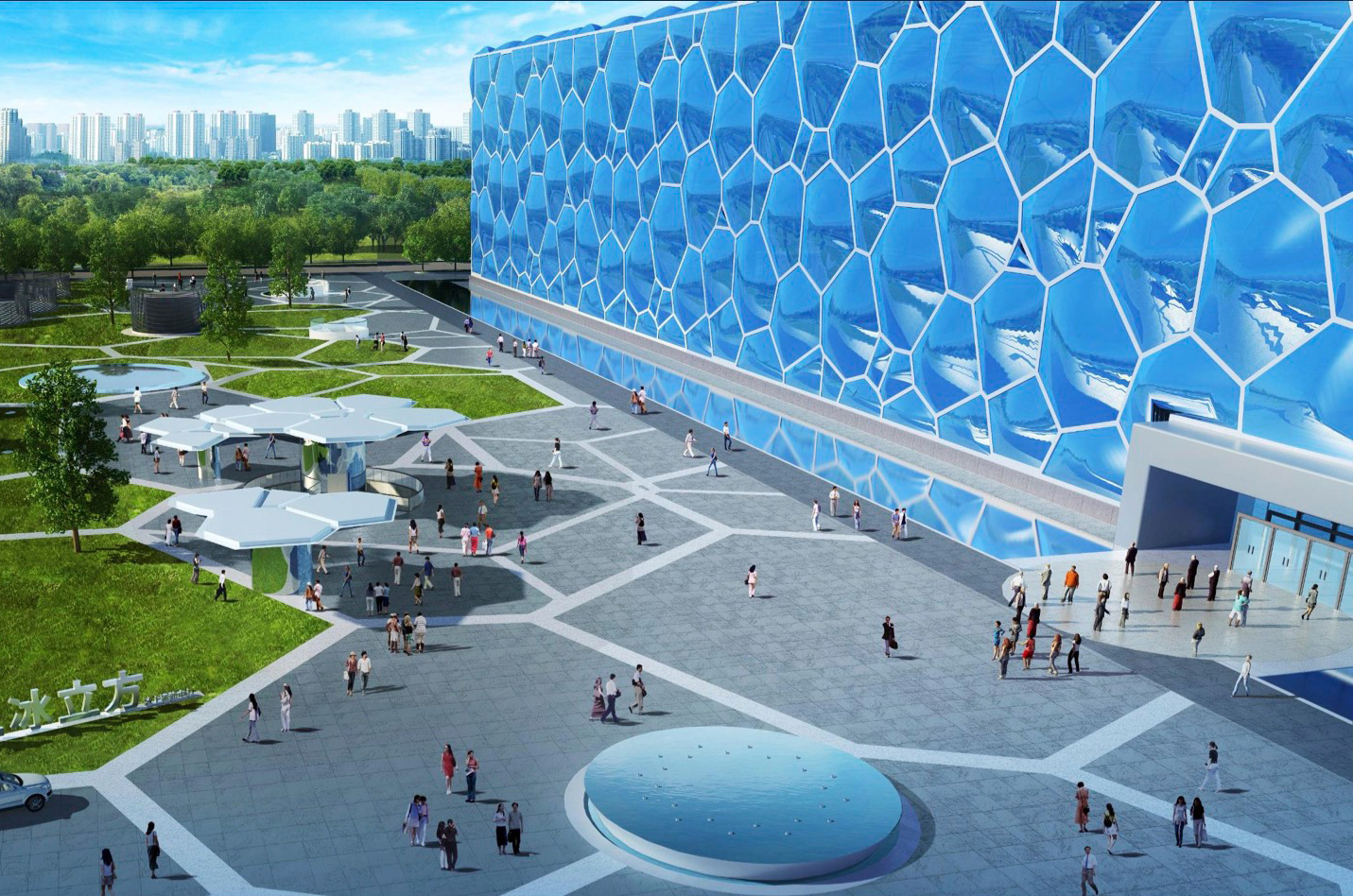
The National Aquatics Center (AKA the Water Cube/Ice Cube) is an iconic venue first built for the 2008 Beijing Olympics and later revamped for the 2022 Beijing Winter Olympics.
It is the only Olympic facility funded by compatriots from the Hong Kong Special Administrative Region, the Macao Special Administrative Region, Taiwan, and overseas Chinese.
Hailed as one of the"New Architectural Wonders of China," it is one of Beijing's new representative structures.
Established in August 2007, Beijing National Aquatics Center Co., Ltd., a wholly-owned subsidiary of Beijing State-Owned Assets Management Co., Ltd., is responsible for the operation and management of the National Aquatics Center.
Following the guiding principle of"maintaining the operation of the Olympic venues well after the games" issued by the Beijing Municipal Committee of the Communist Party of China and the People's Government of Beijing Municipality, the Beijing National Aquatics Center Co., Ltd. aims to become"a world-class venue operation service provider." The team continuously explore how to make full use of the Olympic venue in a comprehensive, recycled, and sustainable manner to provide a Chinese solution for the reuse of the Olympic venues. In 2019, the company was awarded the annual"Sport and Sustainable Architecture" by the International Olympic Committee.Since the opening of the National Aquatics Center after the games, it has continued to expand its business scope. It has since been converted to hold various sports events, tours, large-scale activities, market development projects, franchise events, a water park, and an ice rink. As of the end of 2020, the center had received 26 million tourists, hosted more than 1,600 events, and provided swimming services to about 2.6 million people.
Following the venue retrofit for the 2022 Beijing Winter Olympics, the National Aquatics Center has achieved a comprehensive upgrade of its operational capabilities based on the"water-to-ice conversion" project, and successfully held curling competitions in 2019 and 2021. The center, as a a venue of both 2008 and 2022 Olympic Games, will continue to serve as a model for reusing Olympic venues after the games and innovate and develop the Chinese solution for the provision of services for water and ice events.
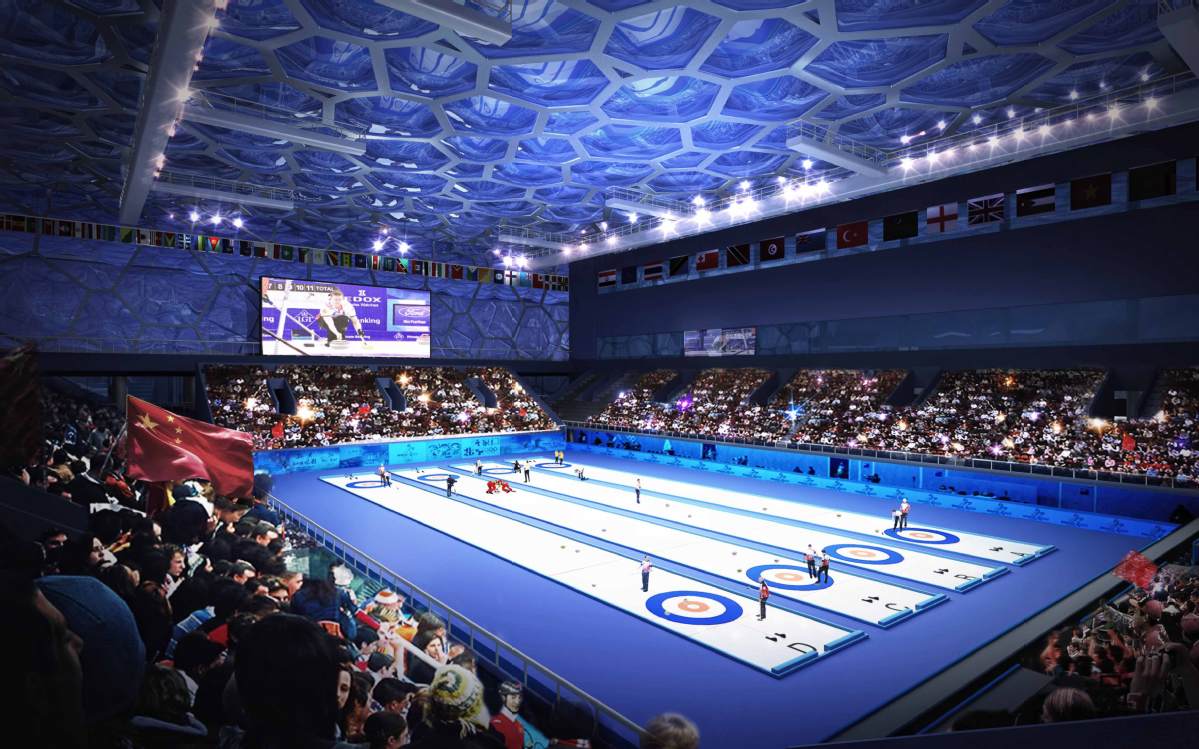
The 2008 Beijing Olympic Games' icon venue-Water Cube, has transformed into "Ice Cube", which is the world's first Winter Olympic Stadium to create curling ice in a swimming pool.
In the Olympic and Paralympic Winter Games, "Water Cube" is set to serve as the curling venue.
The construction of the convertible structure of the Water Cube was completed on Aug. 1.
Following on from the completion of the major construction, the Water Cube will now finish the renovation of sports lighting, ice-making, and air-conditioning systems in the curling competition venues in October, and will hold the China Youth Curling Championship in December to debut.
With the convertible structure of the ice rink and the removable ice-making system, the venue in the future will have both water and ice functions.
After the ice-making equipment and ice layer are removed, the ice rink can be reduced to a swimming pool.
According to the plan, water sports will take place in spring, summer, and autumn, and ice sports will happen during winter.
After the renovation, the venue will receive an intelligent system upgrade as well. The new intelligence system will effectively monitor the changes in the thermal, humid and lighting environment in the competition hall.
It will ensure that under any heat load conditions, the arena can react to changes and provide dynamic heating throughout the indoor environment. For example, when the ice surface temperature of curling track reaches minus 8.5 C, the temperature above 1.5 m of ice surface remains at 10 C, the relative humidity does not exceed 30%, and the temperature in the stands is 16 C to 18 C.
The Water Cube has also carried out a research project on architectural acoustics of the curling hall, in which the most advanced building sound-absorbing materials will be used. Athletes who are more than 40 meters apart at both ends of the track can communicate clearly through shouting.
Underground in the South Square of the Water Cube, the Ice Cube ice sports center is under construction at the same time and is estimated to begin trial operation next May.
The Ice Cube ice sports center will not only provide a competition guarantee for the Olympic and Paralympic Winter Games but also is expected to be used by 100,000 ice sports enthusiasts after the Games.
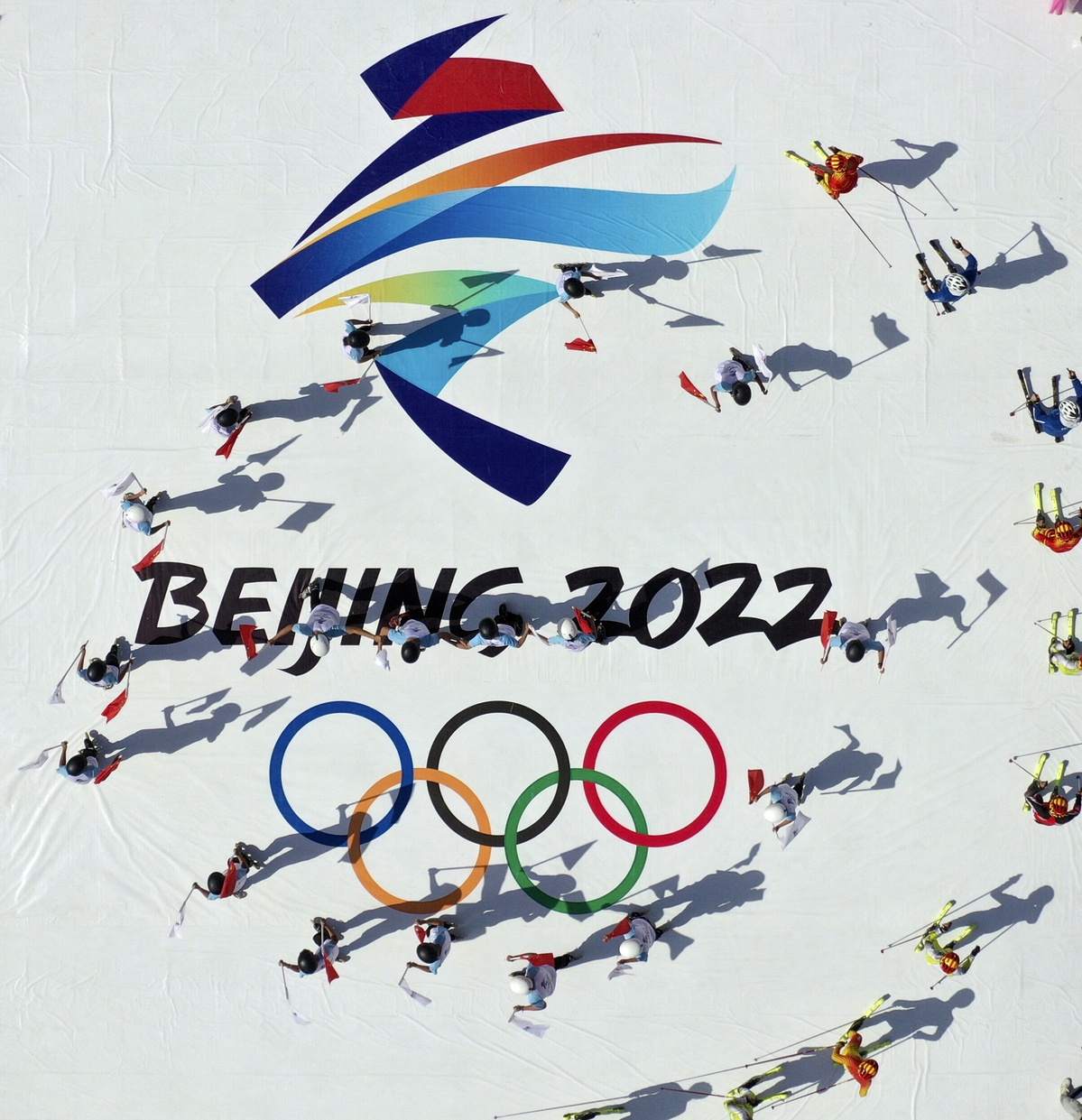
Five years have passed since Beijing's successful bid to host the 2022 Winter Olympiad, and already, the upcoming Games are leaving a legacy, both for the host country and for the wider Olympic movement.
Some Olympic Games come and go as quickly as they arrived, while some stick around in the memories of sports fans for generations. Los Angeles 1984, London 2012 and, of course, Beijing 2008 are all the Olympic Games that immediately spring to mind when anyone mentions the Olympic legacy.
The 2008 Beijing Summer Olympics was perhaps the most iconic games of the modern era. This edition of the Games was like nothing the world had seen before or since. With stunning venues and stadiums, memorable moments, as well as a whole generation of Chinese children inspired to take up sports, Beijing 2008 remains a significant part of recent Olympic legacy.
But with the 2022 Games under two years away, organizers are not content with just replicating the success of the 2008 Games; they want to leave a lasting legacy.
From creating a whole generation of winter sports enthusiasts to building an environmentally sustainable Games, the organizers gave themselves a real challenge, one that they are meeting head on as the Games approach.
In the face of significant challenges and obstacles, such as the global COVID-19 pandemic, China has pushed ahead with the Olympic preparations.
Sustainability
Hosting an Olympic Games comes with costs attached. But the cost of hosting an Olympic Games is more than just monetary. Environmental costs have become an equally important part of hosting an Olympics in the modern age.
For Beijing 2022, a crucial part of the Games has been the recycling and reuse of Beijing 2008 venues.
The iconic'water cube' swimming venue from 2008 has now become the'ice cube,' a premier curling venue.
In Shougang, a crucial part of the Beijing competition zone for the Games, world-class facilities have been built from the disused steel that used to exist on the site. From one of the biggest steel factories in the world to a mecca for winter sports. From the two high-tech rinks that will host ice hockey and ice skating, to the world's first-ever permanent big-air jump that hosted its first-ever top-level event back in December.
Even the ice that the athletes will compete on has been considered. The games will be the first to harness the waste gas carbon dioxide to create the ice surfaces.
In addition, during the venue construction in the Yanqing competition zone, protecting species diversity on the 2,000 meter-high mountain was a top priority. All trees within the zone were registered and had their profiles marked with a QR code. Temporary migration paths were also built for local animals.
"Beijing 2022 puts sustainability high on its agenda and regards it as an indispensable element of staging a'green, inclusive, open and clean' Games and implementing reforms introduced in the Olympic Agenda 2020," said Zhang Jiandong, Executive Vice President of Beijing 2022.
Inspiration
An essential part of the successful Beijing 2022 bid was the promise to get 300 million people into winter sports.
This past winter saw considerable growth in people in China taking up skiing and snowboarding for the first time. 23.45 million people went on the slopes during the 2018-19 season, a massive 21.5 percent increase on the season before.
Even as COVID-19 curtailed this year's ski season, the numbers at one resort in the northeast of the country had doubled from the year before. It has become clear that the Chinese passion for snowsports is growing and growing.
IOC Coordination Commission Chair Juan Antonio Samaranch lavished praise on the Beijing 2022 preparations.
"China has faced an incredibly difficult period over the past few months - our thoughts are with all those impacted," he said.
"Despite these unique circumstances, Beijing 2022 has continued to meet key milestones, a true testament to their determination to provide the perfect stage for the world's top winter athletes in just under two years.
"Not only have we seen important progress with their venues, their efforts to engage millions of people in winter sports is heartening. This aligns very much with the spirit of Olympism, and the thoughts of IOC President Thomas Bach in relation to'sport and physical activity make a great contribution to health' in society," Samaranch said.
Legacy
Even now, just under two years away from the 2022 Olympics, the legacy of the games is there for all to see.
China's ecology-first approach to the games has set a high bar for any future Olympics. In the 21st Century, it is now not enough for a country to just host a spectacular event, the Olympic Games now have to be sustainable and not have any lasting negative environmental impacts.
Beijing 2022 has proved that an Olympics can be sustainable and have an ecological conscience.
In addition, the Games have been used as a powerful tool for poverty alleviation outside the city of Beijing in Chongli.
Chongli, one of the two mountainous zones for the Games, had been an area that had yet to be lifted by China's economic development.
In 2015, 16.8 percent of the 100,000 residents in this town were classed as living below China's national poverty line. However, in May last year, Chongli was officially lifted out of poverty. Nearly 30,000 of its 126,000 population are employed by ski resorts or related companies and organizations.
Beijing 2022 proved that building a'green' Olympics and raising people out of poverty were not mutually exclusive outcomes.
For ordinary Chinese, the Games have been a significant focal point for the future. When applications for Olympic volunteers were released in December 2019, an astonishing 810,000 volunteers applied to help.
Already, five years on from the winning bid and under two years from the Games, Beijing 2022 is shaping up to be one of the most iconic Olympics, just like its 2008 Summer counterpart.
From the dramatic settings, to the stories of environmentally sound practices to a whole generation inspired, Beijing 2022 is undoubtedly a Games that will live long in the memory. For a multi-sport event that has been traditionally dominated by European and North American nations, Beijing 2022 could become the turning point that eventually comes to equalize the worldwide winter sports landscape.
Public Welfare Awards
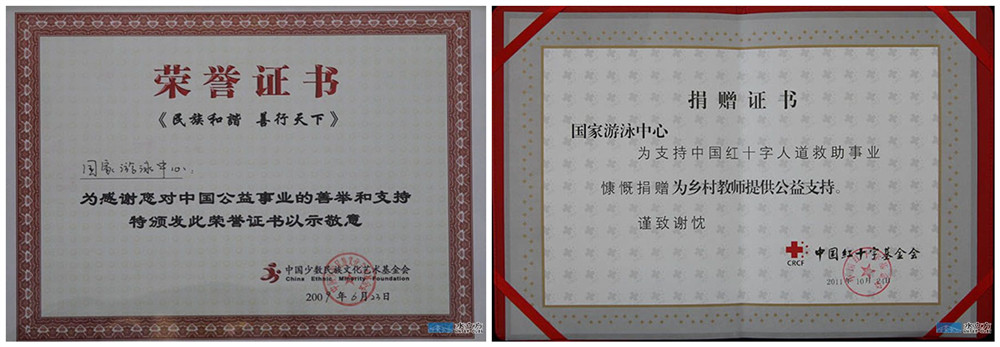
Certificate of Honor issued to the Water Cube on June 22, 2007, by the China National Culture Foundation for its kindness and support for China's public welfare undertakings (left)
Certificate of Donation issued to the Water Cube on October 24, 2011, by the Chinese Red Cross Foundation for its support of rural teachers (right)
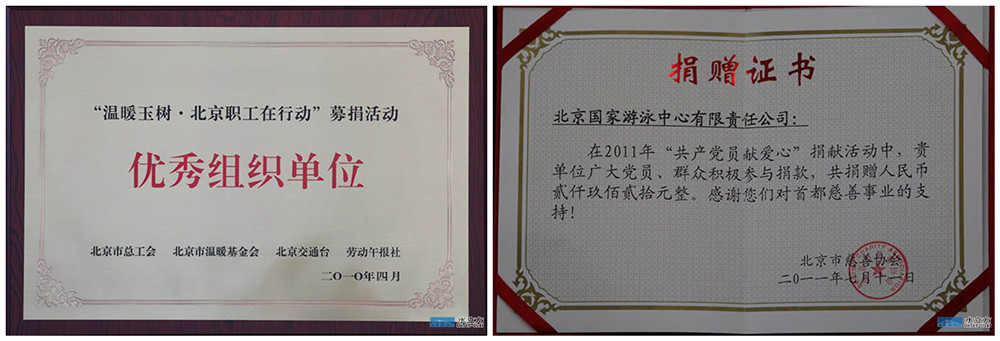
Outstanding Organization Award offered to the Water Cube in April, 2010 for the "Warm Yushu: Beijing Workers in Action" donation event (left)
Certificate of Donation issued to the Water Cube on July 17, 2011, by the Beijing Charity Association (BCA) for its support of the charity (right)
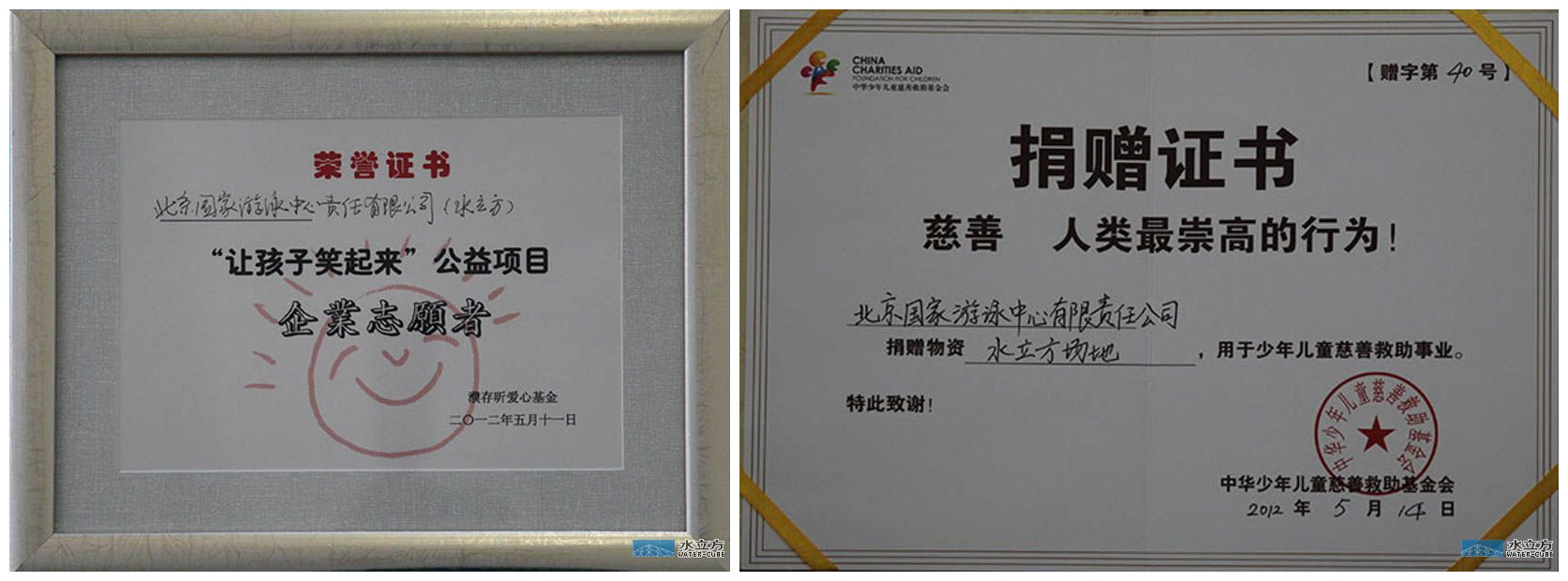
Enterprise Volunteer award for the public welfare project "Let the Children Smile" offered to the Water Cube in May, 2012 (left)
Certificate of Donation issued to the Water Cube on May 14, 2012, by the China Charities Aid Foundation for Children (CCAFC) for its provision of the venue for the children's charity (right)
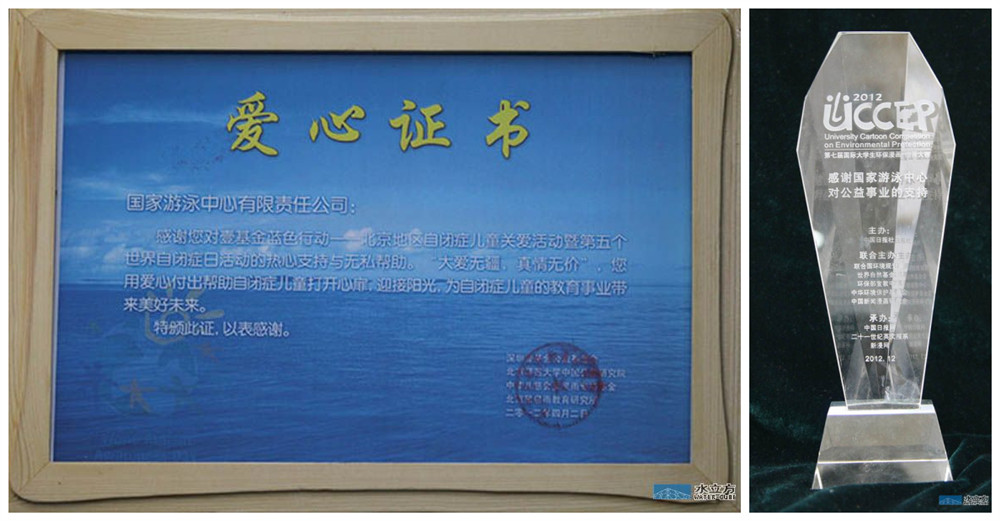
Certificate of Honor, awarded to the Water Cube on April 2, 2012, for its kindness and support for the Fifth World Autism Day event (left)
A trophy awarded to the Water Cube by China Daily for its charitable support (right)
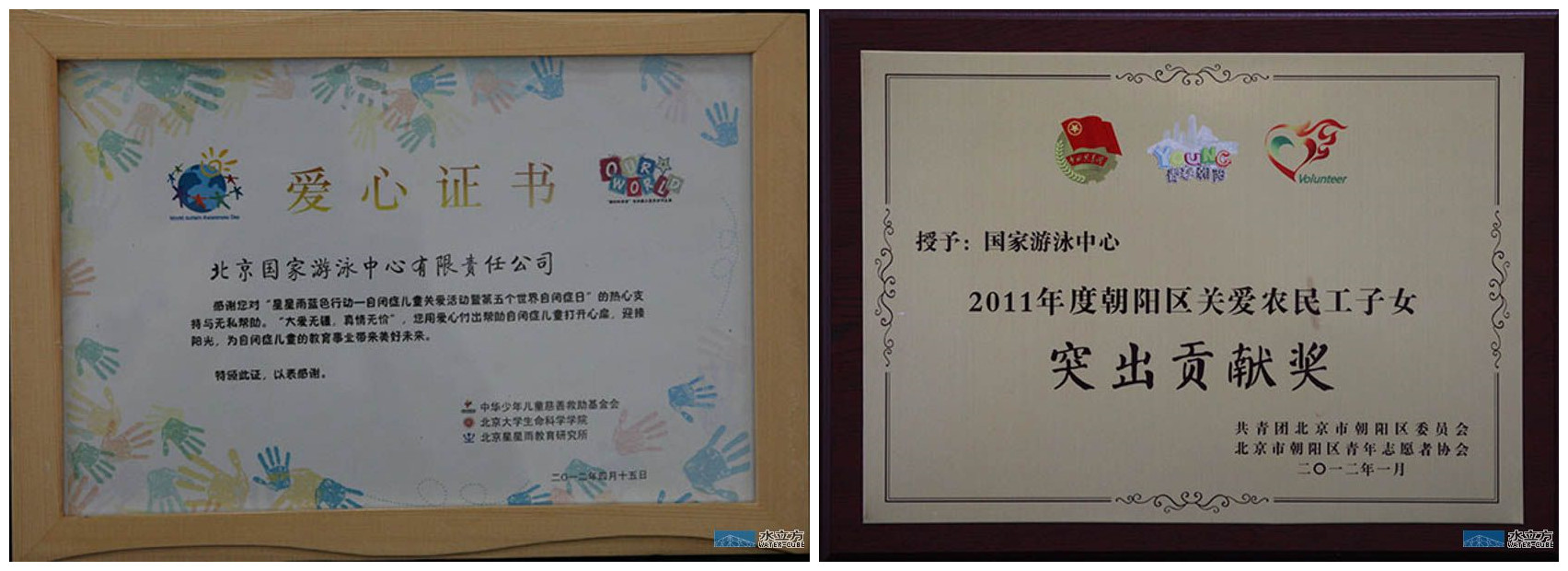
Certificate of Honor, awarded to the Water Cube on April15, 2012, for its kindness and support for the Fifth World Autism Day event (left)
Outstanding Contribution Award of the year (2011) for Chaoyang District, awarded to the Water Cube for its support of migrant workers'children (right)
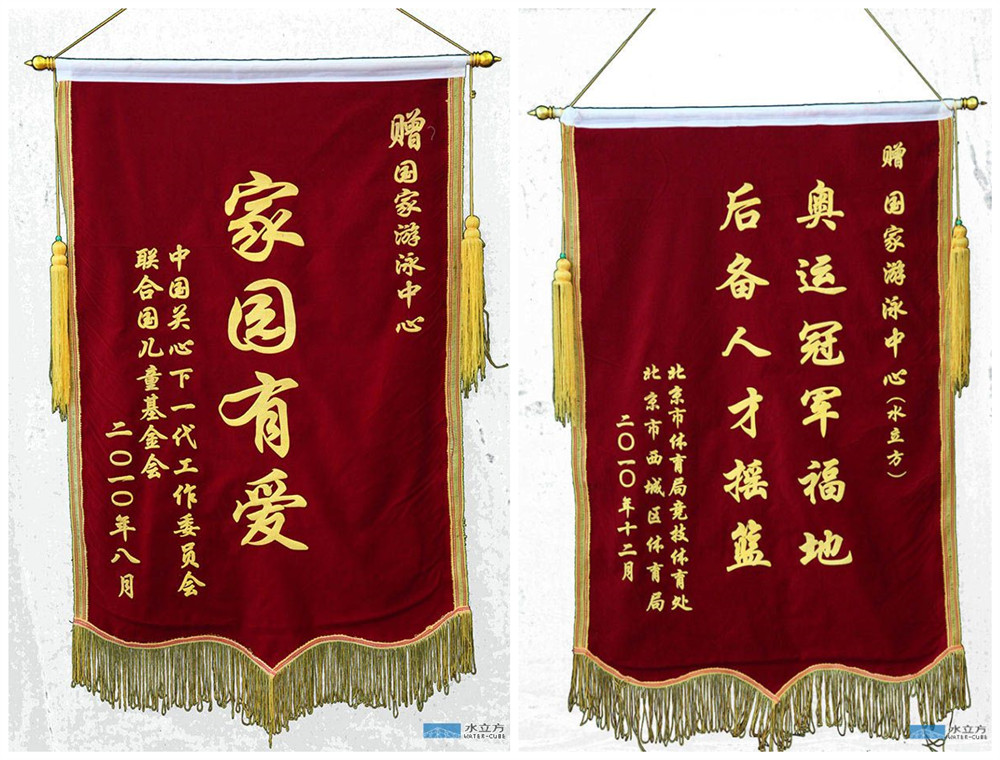
The Water Cube is granted the title "Home with Love" in August, 2010 (left)
The Water Cube is granted the title "The Blessing Land for Olympic Champions and the Cradle of Reserved Talents" in December, 2012 (right)

The China Great Home Action's "Caring and Co-construction Unit" award to the Water Cube in July, 2011 (left)
Certificate of Honor, awarded to the Water Cube on November 22, 2012, by the China Environmental Protection Foundation (CEPF) for its active participation in the "Golden Sun New Energy Charity Project" (right)
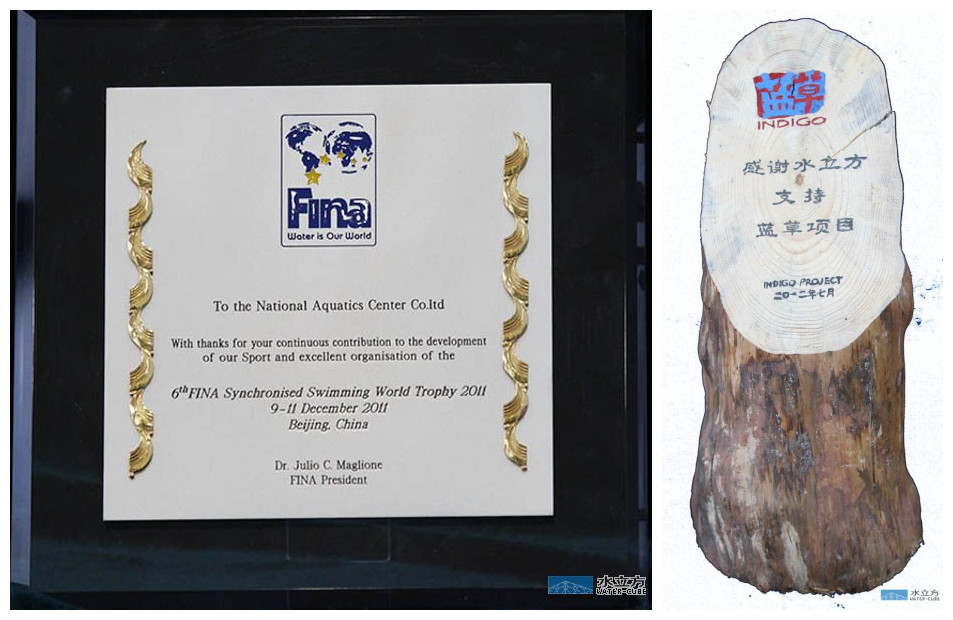
Management Awards
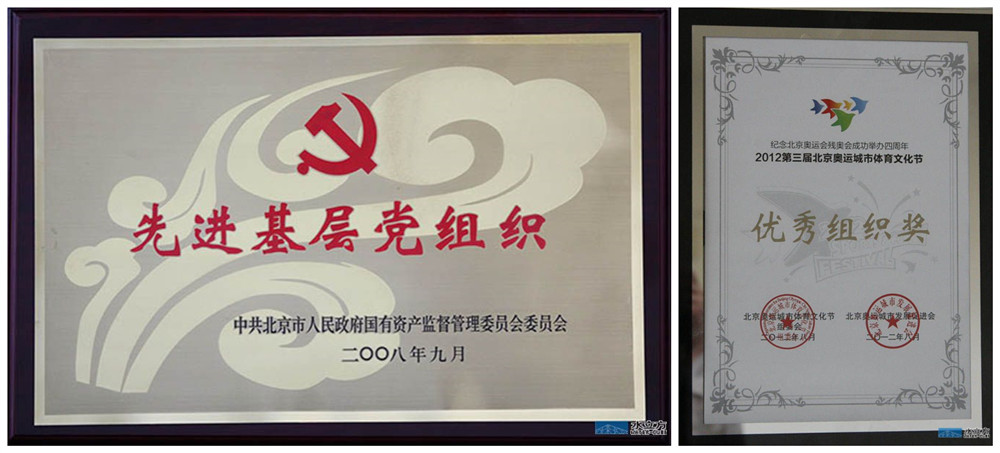
Advanced Primary-Level Party Organization award offered to the Water Cube in September, 2008 (left)
2012 Excellent Organization Award of the 3rd Beijing Olympic City Sports and Culture Festival (right)
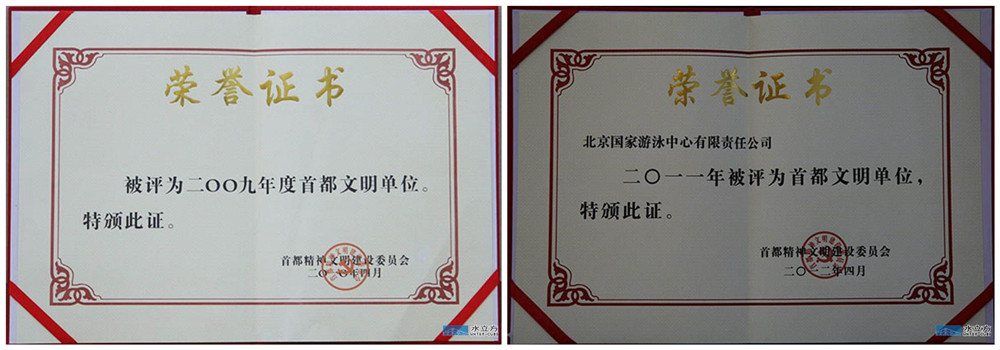
2009 Capital Role Model in Ethical and Cultural Progress (left)
2011 Capital Role Model in Ethical and Cultural Progress (right)
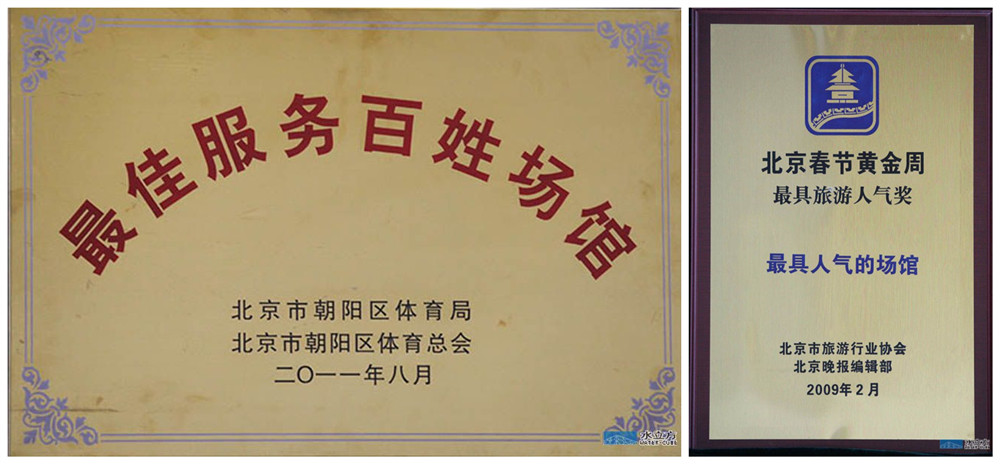
Best Venue for Public Services to the People offered to the Water Cube in August, 2011 (left)
Most Popular Venue of the Spring Festival Golden Week in Beijing offered to the Water Cube in February, 2009 (right)

Capital Role Model in Ethical and Cultural Progress (left)
The First "Top Ten New Tourist Brand Names of Beijing" Award offered to the Water Cube in June, 2010 (right)
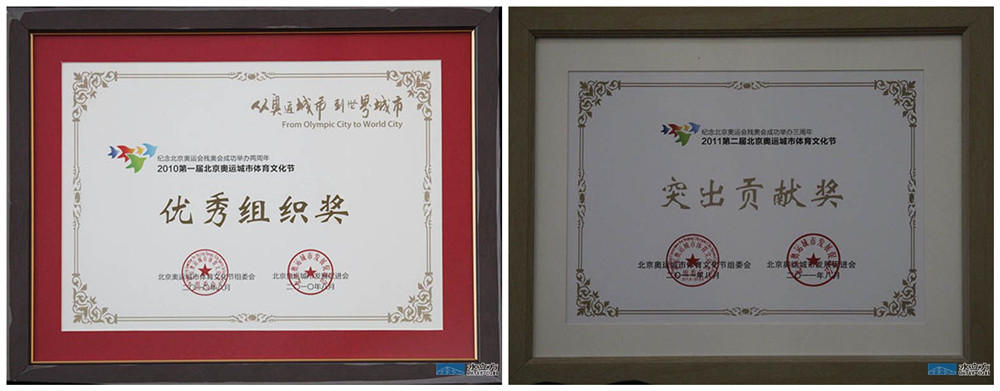
2010 Excellent Organization Award of the First Beijing Olympic City Sports and Culture Festival (left)
2011 Outstanding Contribution Award of the Second Beijing Olympic City Sports and Culture Festival (right)
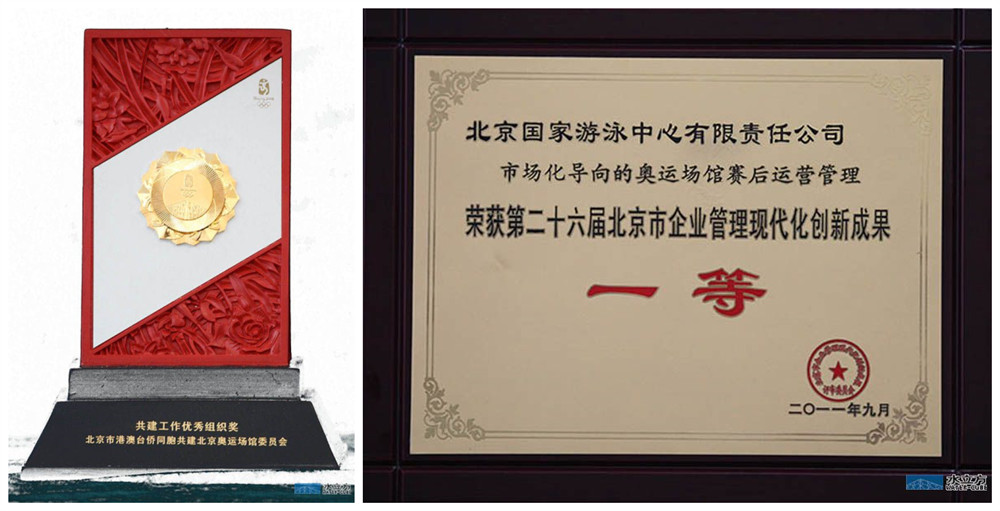
Excellent Organization Award in Crucial Work offered to the Water Cube by the Beijing Olympic Venue Co-construction Committee of Hong Kong, Macao, and Taiwan Compatriots and overseas Chinese (left)
The First Prize of the 26th Beijing Enterprise Innovation Achievements of Modern Management offered to the Water Cube in September, 2011 (right)
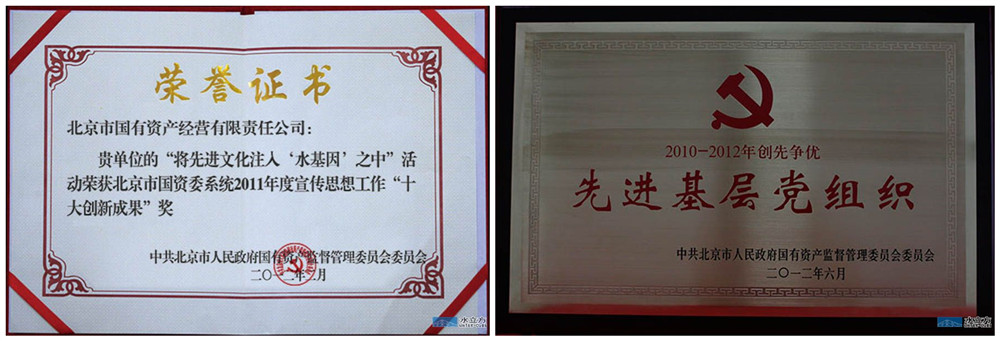
2011 "Top Ten Innovative Achievements" Award for publicity, by the State-owned Assets Supervision and Administration Commission of People's Government of Beijing Municipality (left)
2010- 2012 Advanced Primary-Level Party Organization in "Striving for Excellence" activity (right)
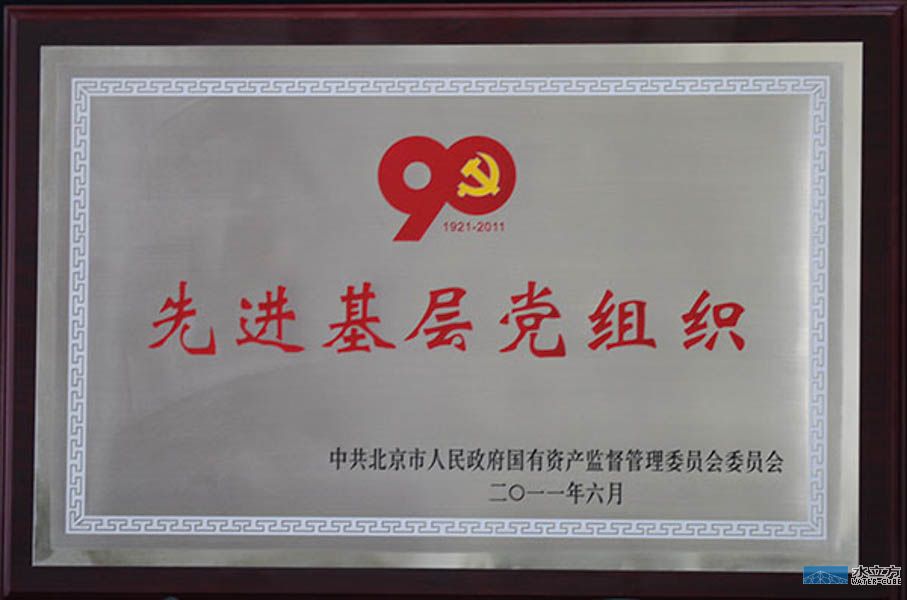
Advanced Primary-Level Party Organization award offered to the Water Cube in June, 2011, by the State-owned Assets Supervision and Administration Commission of People's Government of Beijing Municipality
_ueditor_page_break_tag_Architectural Awards
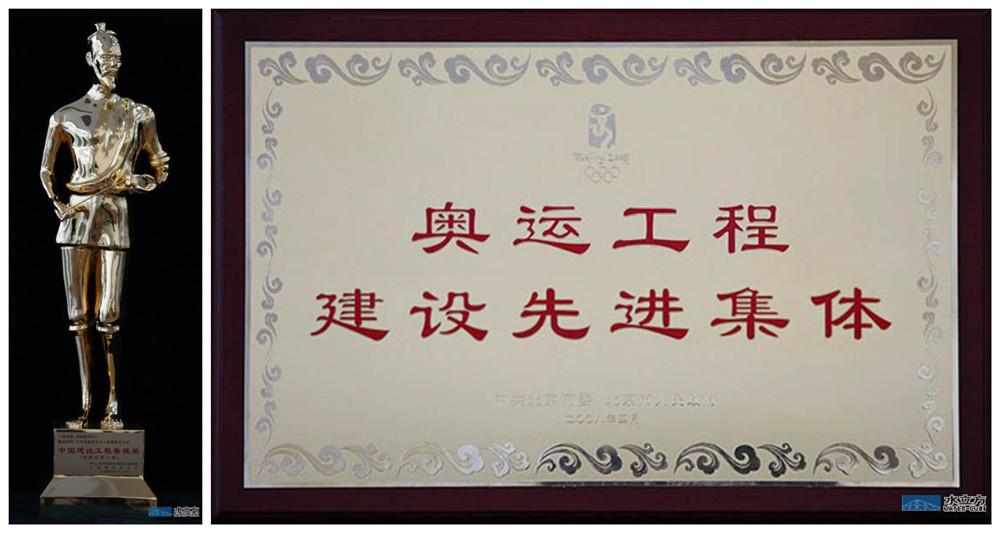
Exemplary Organization of Olympic Project Construction awarded to the Water Cube in April, 2008
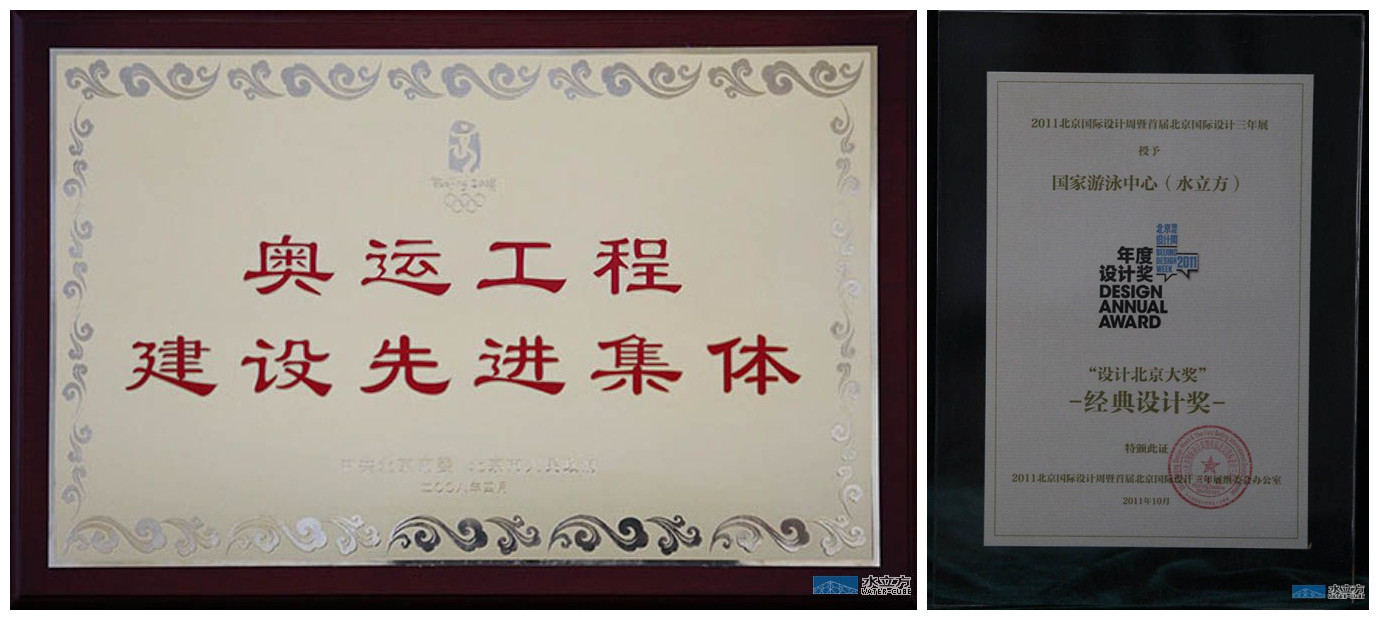
Exemplary Organization of Olympic Project Construction awarded to the Water Cube in April, 2008 (left)
2011 Classic Design Award for Beijing International Design Week (right)
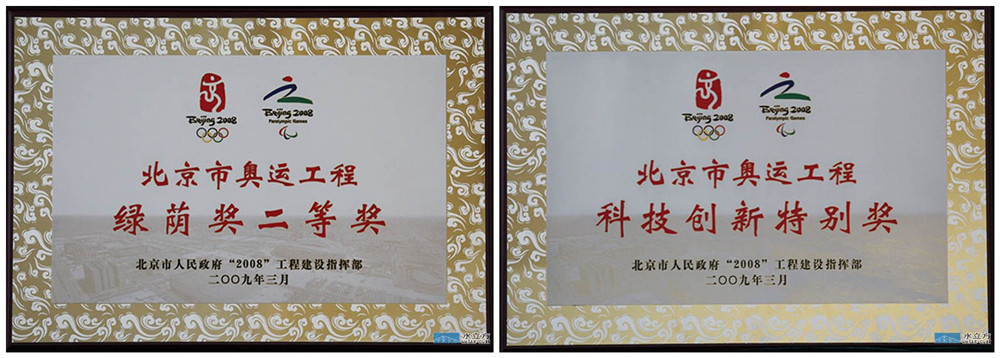
The Second Prize of Beijing Olympic Project "Green Shade Award" awarded to the Water Cube in March, 2009 (left)
The Special Award for Scientific and Technological Innovation of Beijing Olympic Project awarded to the Water Cube in March, 2009 (right)
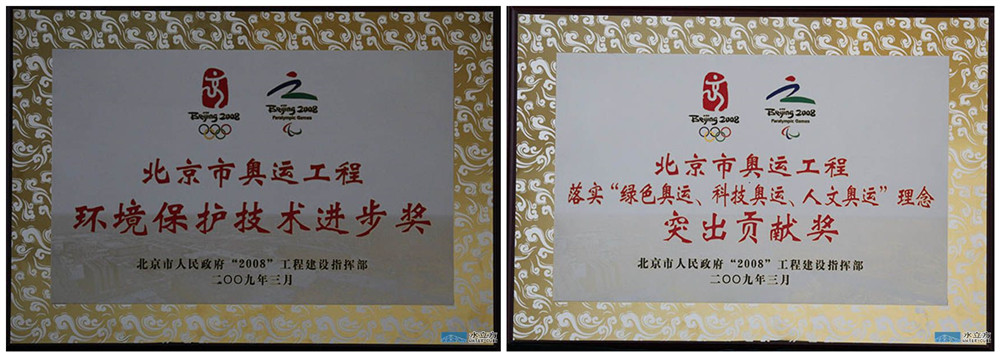
The Technological Progress Award for Environmental Protection of Beijing Olympic Project awarded to the Water Cube in March, 2009 (left)
Outstanding Contribution Award for the implementation of "Green Olympics, Sci-Tech Olympics, and Humanistic Olympics" concept of Beijing Olympic projects awarded to the Water Cube in March, 2009 (right)
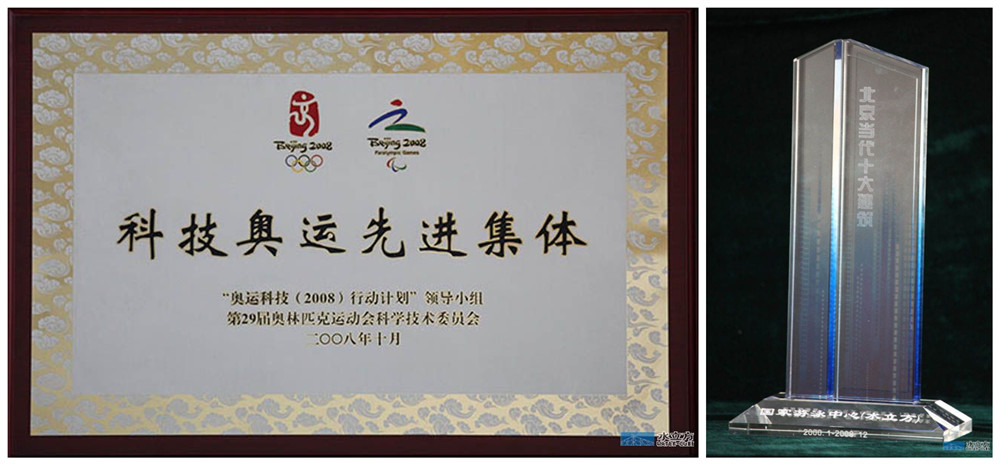
Exemplary Organization of Sci-Tech Olympics awarded to the Water Cube in October, 2008 (left)
Top Ten Contemporary Buildings in Beijing (right)
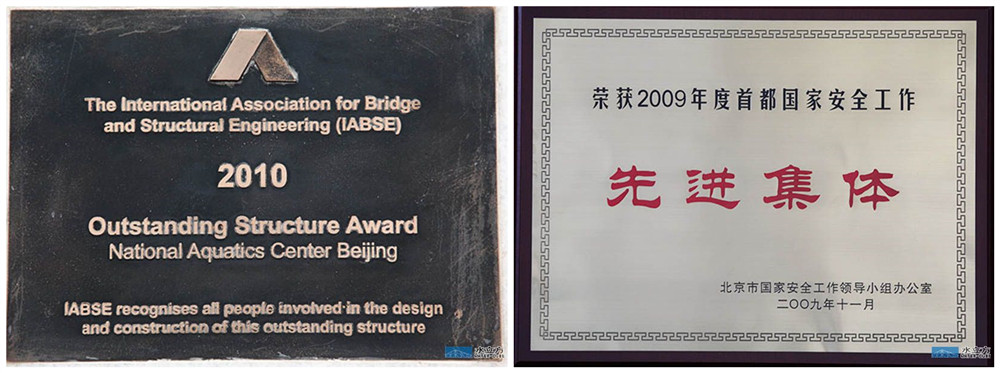
Outstanding Structure Award offered to the Water Cube in 2010 by the International Association for Bridge and Structural Engineering (IABSE) (left)
2009 Exemplary Organization of Capital's National Security Work (right)
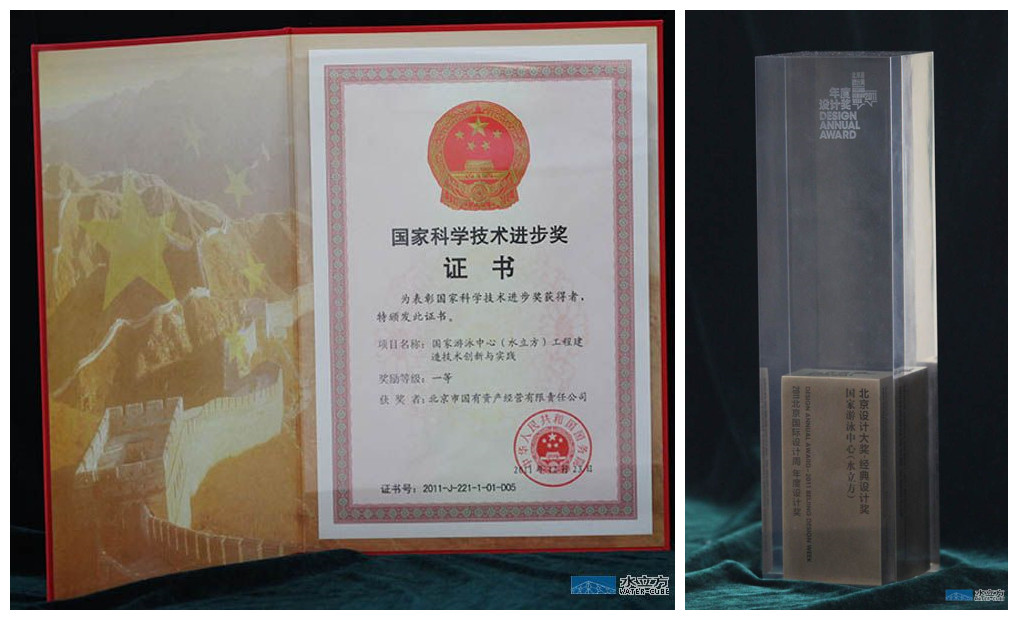
First Prize of the National Scientific and Technological Progress Award in 2011 (left)
Service Hotlines:
Visit: 010 - 84370112 / 84370116
Swimming: 010 - 84378912
Water Park: 010 - 84378966 / 84378963
Complaint:010 - 84370125
Venue Rental:010 - 84378842 / 84374571
Address: Olympic Park, 11 East Tianchen Road, Chaoyang District, Beijing
Competition Venue
The Olympic Competition Venue encompasses the Water Cube's core area. The hall is 116 meters long, 70 meters wide, and 30 meters high, covering 8,120 square meters in total. It has a swimming pool measuring 25 x 50 meters, with a depth of 3 meters, and a diving pool measuring 25 x 30 meters, with a depth of 4.5-5.5 meters.
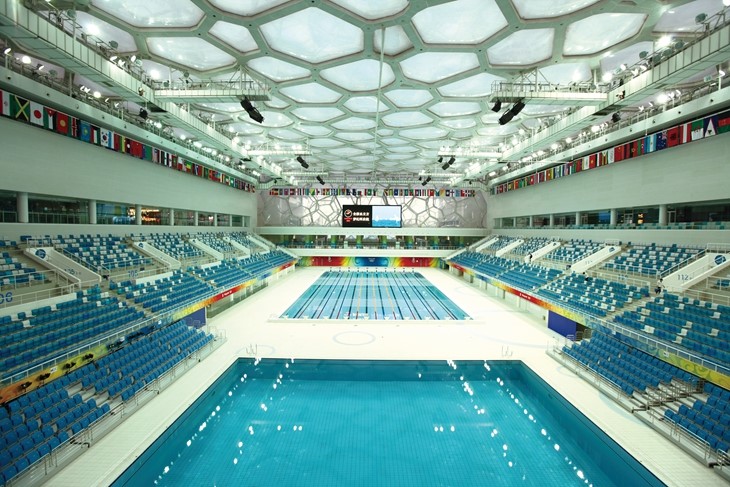
The stands feature more than 5,000 blue color seats, making them look like droplets of water from the pools below. The hall is well ventilated and combines natural light with a pleasing sound design for a pleasant, comfortable, and exciting experience.
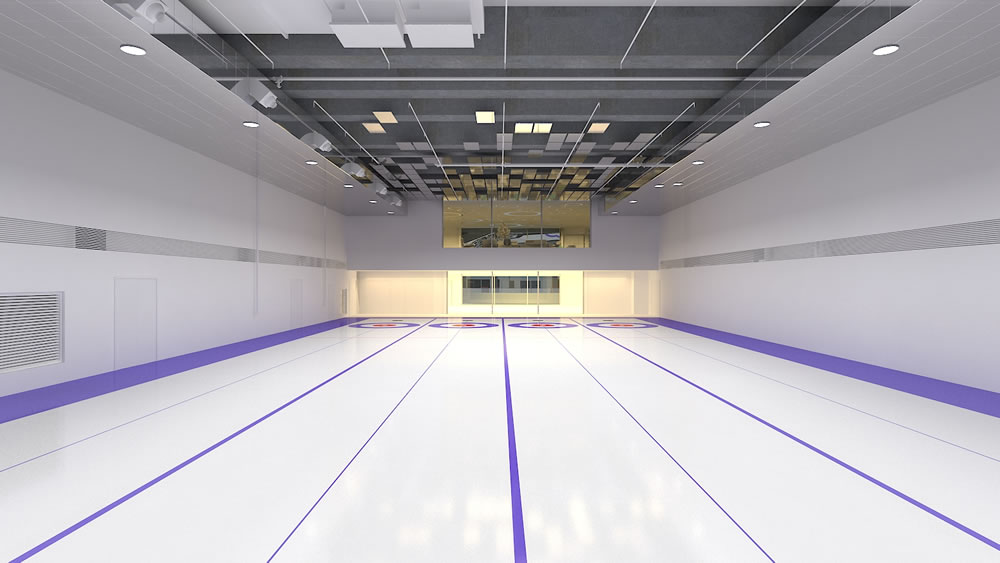
Warm-up Pool
The warm-up pool is built in full compliance with international competition standards and features both a deep area and a shallow area. The water is ozone-sterilized and supplemented by chlorine preparations to ensure optimal water quality. The ventilation system maintains a pool-side temperature of 22-26 degrees Celsius at all times.
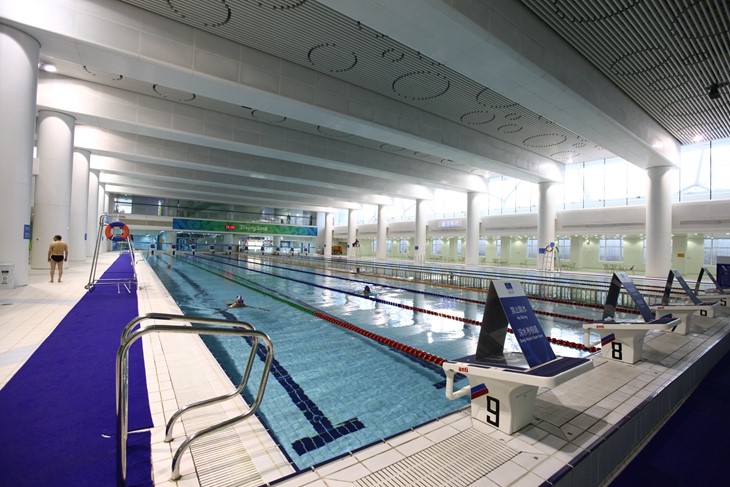
Multifunctional Hall
The Multifunctional Hall is situated at the comprehensive functional zone in the western flank of the Water Cube. The hall is 60 meters long, 40 meters wide, and 17 meters high, covering an area of 2,400 square meters and has three standard-sized indoor tennis courts. It has a seating capacity of approximately 1,000 as well as adequate space for exhibitions, providing a top-notch venue to host domestic and international culture and arts events.
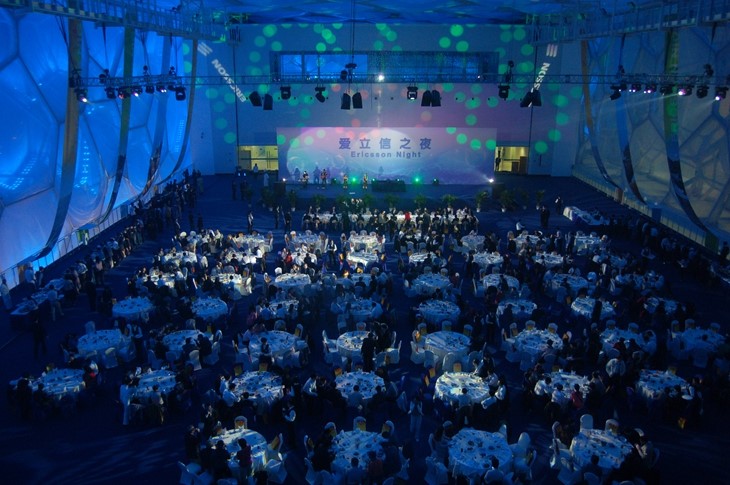
Water Park
As one of the largest Water Park in China and one of the world's most sophisticated indoor water parks, this venue features numerous recreational facilities and crystal-like water. Its location within the Water Cube also allows visitors to take in the charm of this massive and magical structure.
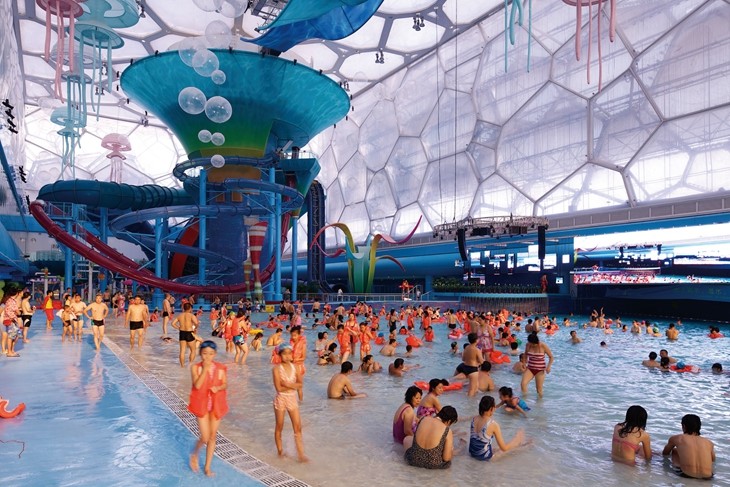
Exhibition in Commemoration of the Support to the 2008 Beijing Olympics from compatriots from Hong Kong, Macao, Taiwan, overseas Chinese, and foreign nationals of Chinese origin
This exhibition shows how the Water Cube was the only Olympic venue to be built using donations from compatriots fromHong Kong, Macao, Taiwan, and overseas Chinese. The exhibition's photography captures how the sons and daughters of the Chinese nation generously donated their money to the Beijing Olympics and for the construction of the Olympic venue. The pictures rekindled feelings of the kith and kin between the Chinese people.
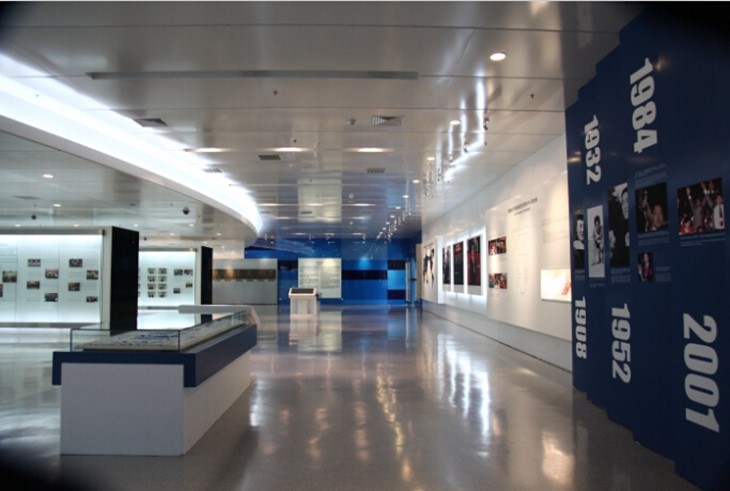
Exhibition in Commemoration of the Construction of the Water Cube, the Swimming Event Venue of the Beijing Olympics
This exhibition is situated on the fourth floor of the eastern side of the Water Cube's South Building. Covering nearly 300 square meters, the exhibition area boasts top-rate facilities and specialized and systemized services run by a professional operating team.
The exhibits closely relate to swimming and display their functions for humanistic and artistic exchange. The area is also home to commercial operations that span teaching, recreation, and communication activities.
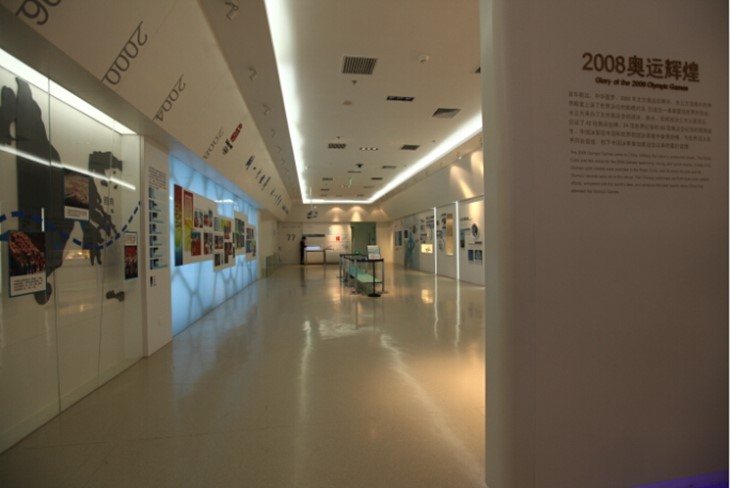
Water Cube Secret Exploration Hall
This hall reviews how the magic structure of the Water Cube was built. The rich array of objects and high-tech demonstrations help visitors discover the building's three main philosophies of "Ecology, Science and Technology, and Humanism" that the structure reflects and enables.
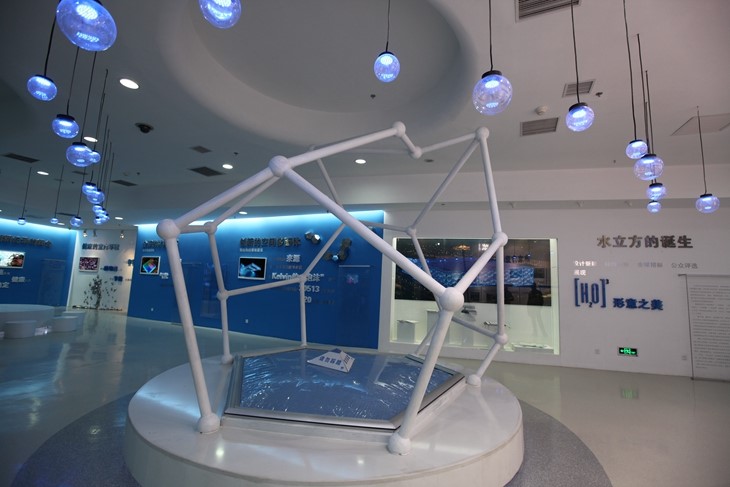
Water Droplet Theater
Spanning about 200 square meters, the Water Droplet Theater has 147 seats and can display 3D and HD laser films using advanced digital laser projection equipment. It can also be used as a conference room and a site for commercial promotions and other commercial and cultural activities.
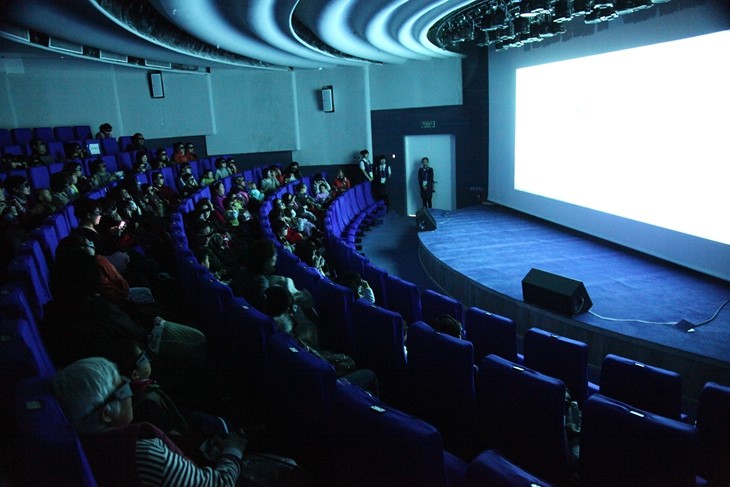
Side Buildings
TheWater Cube features two smaller buildings: a four-floor building on the southern side and a three-floor building on the north. They are replete with retail shops, coffee houses, a POP bar, a performance and film hall, rehearsal rooms, and small multi-functional halls.
They serve as sites for selling sportswear and gear, fashionable goods, and souvenirs, as well as sites for catering, coffee, tea, and other services for business talks and pleasure. They also offer a space for exhibitions, product promotion, conferences, parties, sports events, recreational activities, and high-end business talks.
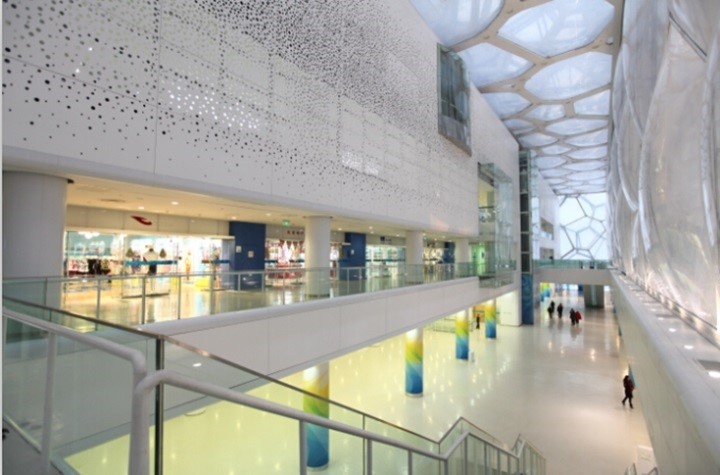
South Square
The South Square is an outdoor activity area on the southern flank of the Water Cube. Covering 10,000 square meters, it accepts bookings for large-scale public relations activities, the performing arts, and exhibitions.
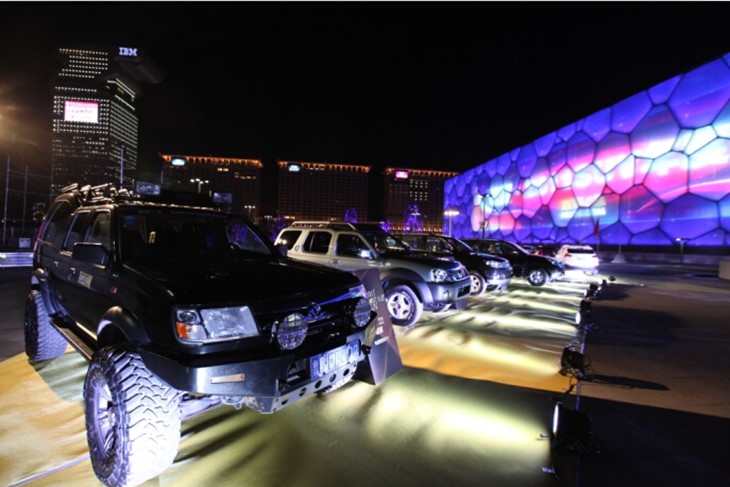
Opening Hours:
Peak season: 9 a.m - 10 p.m. (visitors must start to leave at 9:30 p.m.)
Off-peak season: 9 a.m. - 7 p.m. (visitors must start to leave at 6:30 p.m.)
Working Hours of the Box Office:
Peak season: 9 a.m. - 8:50 p.m. (no admission after 9 p.m.)
Off-peak season: 9 a.m. - 5:50 p.m. (no admission after 6 p.m.)
Specific working times shall be subject to opening times of the venue.
Ticket prices:
Full price: RMB 30 yuan per ticket
Half price: RMB 15 yuan per ticket
Inquires: 010 - 84370112/84370116
Complaints and rescue: 010 - 84370125
Private guided tours: 010 - 84370117
For tourists:
1. Ticket prices for tourists:
Full price: RMB 30 yuan per ticket
Half price: RMB 15 yuan per ticket
2. Half-price tickets apply to:
People between the age of 60 and 64 with a valid "elderly certificate" or valid ID card; soldiers (including armed policemen) in active service with a valid certificate; university, middle school, and primary school studentswith a valid "student card."
3. Complimentary visits apply to:
Water Cube donators with a valid document of proof; retired cadres with a valid "retirement certificate"; people above the age of 65 with a valid document; people with disabilities with a valid document; children aged or under 6, or of or below 1.2 meters tall and accompanied by an adult with a ticket.
Notes:
Documents mentioned above must be issued by relevant departments within the People's Republic of China (including Hong Kong, Macao, and Taiwan) for individuals to enjoy discounted entry.
Those who enjoy discounted tickets must show the relevant original documents when buying tickets and at the entry check-in point. Those who enjoy complimentary visits must show the relevant documents at the check-in point.
Groups entitled to the above preferential policies may dial hotlines 010 - 84370112 and 84370116 for consultation and booking.
Beijing National Aquatics Center Co., Ltd. reserves the right to the final interpretation of the preferential policies.
For travel agency tour groups:
1. Ticket prices for tour groups:
Full price: RMB 21 yuan per ticket
Half price: RMB 15 yuan per ticket
2. Ticketing instructions:
The assigned tour group leader or tour guide for each travel-agency-led group will be required to purchase group tickets at the group ticket office with their tour guide ID card and the group itinerary. Each group will be issued a group ticket. When purchasing discounted tickets, the travel agency must follow policy guidelines and provide the relevant documents.
3. Procedure for purchasing travel agency group tickets:
1). On the day of the visit, the tour guide must purchase tickets at the west window of the Water Cube with his or her tour guide ID card and the group itinerary. Fill out the invoice registration form if an invoice is required.
2). The tour guide must enter along with all group visitors through Gate 7 on the west side of the Water Cube. The group ticket and itinerary must be provided for inspection at the time of entry into the venue. The tour guide will gain free admission with the provision of his or her valid tour guide ID card.
Tour guide appointment:
Tel. for guide service: 010 - 84370117
Guide appointment: Groups must make an appointment three days before visitation; reception hours: 9 a.m.5 p.m.
Guide commissions: RMB 100 yuan per tour (Chinese), RMB 150 yuan per tour (English). Tours are subject to a time limit.
Visitor regulations:
1. Please buy tickets at authorized ticketing offices in order to ensure your legitimate rights and interests. Tickets are non-refundable.
2. All visitors must pass through a security check. Lighters, explosives, or inflammable substances and devices, knives, and other dangerous articles cannot be brought into the venue. Pets are not allowed inside the venue.
3. Visitors are requested to stay in the designated areas within opening hours. Visitors are not allowed access to non-public and office areas. Visitors shall be responsible and provide compensation accordingly in the case of accidents or damage.
4. Please do not mark, fold, or damage the ticket's QR code. In the event that the QR code cannot be recognized and the ticket holder cannot enter the venue, the ticket purchaser shall take responsibility.
5. Without permission, visitors cannot make, copy, or utilize any photographs and audio-visual materials related to the venue. Visitors may not use photographs or audio-visual materials related to the venue for any commercial purposes.
6. The entire venue is non-smoking. Please keep the venue clean and hygienic.
7. In case of the adjustment of opening hours, please visit the official website of the National Aquatics Center (www.water-cube.com) or the official WeChat for further details, or check for notices at the entrance. In case of large-scale events, please follow the venue's temporary arrangements.
8. In the case of swimming competitions or large-scale events, visitation to the competition hall will be suspended.
9. The Beijing National Aquatics Center Co., Ltd. reserves the final right to interpret the Visitor Regulations.
Parkling lot service hours: 6 a.m.-10 p.m.
Parking Fee: RMB 5 yuan per hour
Capacity: 200 vehicles (fewer than 200 during hours for large-scale events)
Note: The parking lot is only open to small vehicles (≤7 seats)
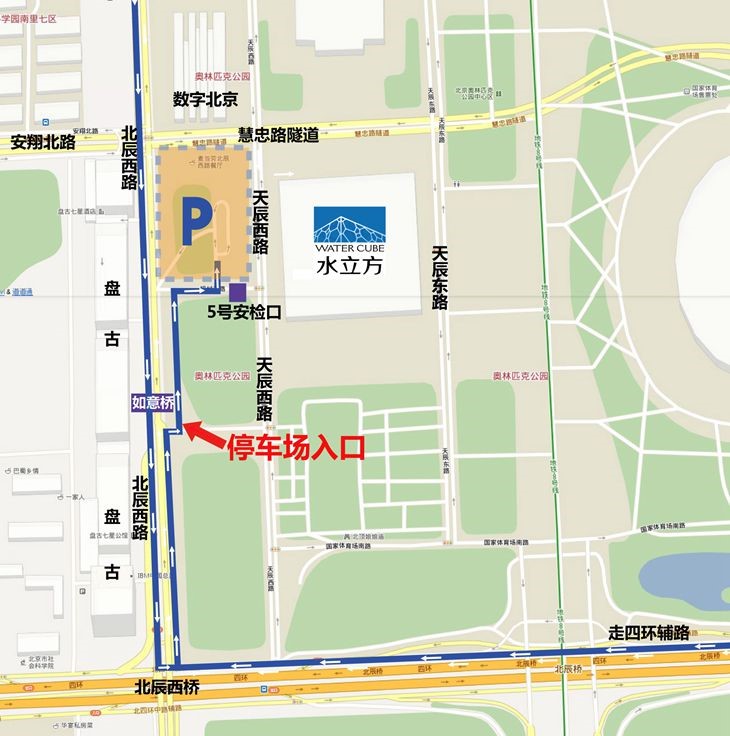

Five years have passed since Beijing's successful bid to host the 2022 Winter Olympiad, and already, the upcoming Games are leaving a legacy, both for the host country and for the wider Olympic movement.
Some Olympic Games come and go as quickly as they arrived, while some stick around in the memories of sports fans for generations. Los Angeles 1984, London 2012 and, of course, Beijing 2008 are all the Olympic Games that immediately spring to mind when anyone mentions the Olympic legacy.
The 2008 Beijing Summer Olympics was perhaps the most iconic games of the modern era. This edition of the Games was like nothing the world had seen before or since. With stunning venues and stadiums, memorable moments, as well as a whole generation of Chinese children inspired to take up sports, Beijing 2008 remains a significant part of recent Olympic legacy.
But with the 2022 Games under two years away, organizers are not content with just replicating the success of the 2008 Games; they want to leave a lasting legacy.
From creating a whole generation of winter sports enthusiasts to building an environmentally sustainable Games, the organizers gave themselves a real challenge, one that they are meeting head on as the Games approach.
In the face of significant challenges and obstacles, such as the global COVID-19 pandemic, China has pushed ahead with the Olympic preparations.
Sustainability
Hosting an Olympic Games comes with costs attached. But the cost of hosting an Olympic Games is more than just monetary. Environmental costs have become an equally important part of hosting an Olympics in the modern age.
For Beijing 2022, a crucial part of the Games has been the recycling and reuse of Beijing 2008 venues.
The iconic'water cube' swimming venue from 2008 has now become the'ice cube,' a premier curling venue.
In Shougang, a crucial part of the Beijing competition zone for the Games, world-class facilities have been built from the disused steel that used to exist on the site. From one of the biggest steel factories in the world to a mecca for winter sports. From the two high-tech rinks that will host ice hockey and ice skating, to the world's first-ever permanent big-air jump that hosted its first-ever top-level event back in December.
Even the ice that the athletes will compete on has been considered. The games will be the first to harness the waste gas carbon dioxide to create the ice surfaces.
In addition, during the venue construction in the Yanqing competition zone, protecting species diversity on the 2,000 meter-high mountain was a top priority. All trees within the zone were registered and had their profiles marked with a QR code. Temporary migration paths were also built for local animals.
"Beijing 2022 puts sustainability high on its agenda and regards it as an indispensable element of staging a'green, inclusive, open and clean' Games and implementing reforms introduced in the Olympic Agenda 2020," said Zhang Jiandong, Executive Vice President of Beijing 2022.
Inspiration
An essential part of the successful Beijing 2022 bid was the promise to get 300 million people into winter sports.
This past winter saw considerable growth in people in China taking up skiing and snowboarding for the first time. 23.45 million people went on the slopes during the 2018-19 season, a massive 21.5 percent increase on the season before.
Even as COVID-19 curtailed this year's ski season, the numbers at one resort in the northeast of the country had doubled from the year before. It has become clear that the Chinese passion for snowsports is growing and growing.
IOC Coordination Commission Chair Juan Antonio Samaranch lavished praise on the Beijing 2022 preparations.
"China has faced an incredibly difficult period over the past few months - our thoughts are with all those impacted," he said.
"Despite these unique circumstances, Beijing 2022 has continued to meet key milestones, a true testament to their determination to provide the perfect stage for the world's top winter athletes in just under two years.
"Not only have we seen important progress with their venues, their efforts to engage millions of people in winter sports is heartening. This aligns very much with the spirit of Olympism, and the thoughts of IOC President Thomas Bach in relation to'sport and physical activity make a great contribution to health' in society," Samaranch said.
Legacy
Even now, just under two years away from the 2022 Olympics, the legacy of the games is there for all to see.
China's ecology-first approach to the games has set a high bar for any future Olympics. In the 21st Century, it is now not enough for a country to just host a spectacular event, the Olympic Games now have to be sustainable and not have any lasting negative environmental impacts.
Beijing 2022 has proved that an Olympics can be sustainable and have an ecological conscience.
In addition, the Games have been used as a powerful tool for poverty alleviation outside the city of Beijing in Chongli.
Chongli, one of the two mountainous zones for the Games, had been an area that had yet to be lifted by China's economic development.
In 2015, 16.8 percent of the 100,000 residents in this town were classed as living below China's national poverty line. However, in May last year, Chongli was officially lifted out of poverty. Nearly 30,000 of its 126,000 population are employed by ski resorts or related companies and organizations.
Beijing 2022 proved that building a'green' Olympics and raising people out of poverty were not mutually exclusive outcomes.
For ordinary Chinese, the Games have been a significant focal point for the future. When applications for Olympic volunteers were released in December 2019, an astonishing 810,000 volunteers applied to help.
Already, five years on from the winning bid and under two years from the Games, Beijing 2022 is shaping up to be one of the most iconic Olympics, just like its 2008 Summer counterpart.
From the dramatic settings, to the stories of environmentally sound practices to a whole generation inspired, Beijing 2022 is undoubtedly a Games that will live long in the memory. For a multi-sport event that has been traditionally dominated by European and North American nations, Beijing 2022 could become the turning point that eventually comes to equalize the worldwide winter sports landscape.

Our Wechat

Our Production